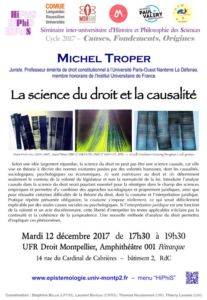HiPhiS seminar "Legal science and causality".
This event is over!
Tuesday, December 12, 2017 from 5:30 p.m. to 7:30 p.m.
Faculté de Droit, amphi 001 Pétrarque, RdC bâtiment 2
Free admission
 Inter-university seminar on the History and Philosophy of Science, 2017 cycle "Causes, foundations, origins".
Inter-university seminar on the History and Philosophy of Science, 2017 cycle "Causes, foundations, origins".
Lecture presented by Michel Troper, jurist, Professor Emeritus of Constitutional Law at Paris-Ouest Nanterre La Défense University, honorary member of the IUF.
Summary:
The title of this paper may appear to contain a contradiction in terms. In fact, there is a major current of opinion that contests the very idea of a science of law, but among those who admit it, there is a debate between authors who think that law is a science and others who believe that if law itself is not a science, it can be the object of a specific science. In either case, it cannot be a causal science. If, indeed, law itself is a science, it is because jurists (especially judges) would be capable of discovering the right solution in every case, but the process of discovery would owe nothing to causal analysis.
On the other hand, a science of law should confine itself to describing existing norms, i.e. norms laid down by human wills. These wills are certainly the product of a series of causes, but on the one hand, these causes are of a sociological, psychological or economic nature, and are therefore outside the law, and on the other hand, they determine only the content of the will, not the normativity. The formation of the legislator's will can be explained in this way, but not the binding nature of the law, which results only from conformity with the constitution, while the constitution itself cannot be considered the cause of the law.
The introduction of causal analysis into the science of law would, however, be of the utmost importance, both to reintegrate the science of law into the field of empirical sciences, to enable the sociological approach to be combined with the properly legal approach, and to resolve some of the difficulties of legal theory. These include custom and interpretation. Custom is a practice that is repeated, held to be obligatory and which becomes legally binding. However, while repetition or belief in compulsory nature can easily be explained by social or psychological causes, real compulsory nature cannot be explained in this way. It is now widely accepted that legal interpretation is, at least in large part, a function of the will and a discretionary act. If the interpreter is free to give the applicable text the meaning he or she wishes, it is difficult to understand the continuity and coherence of case law.
We will therefore present a method for analyzing the law in order to account for and explain these phenomena.
To find out more
